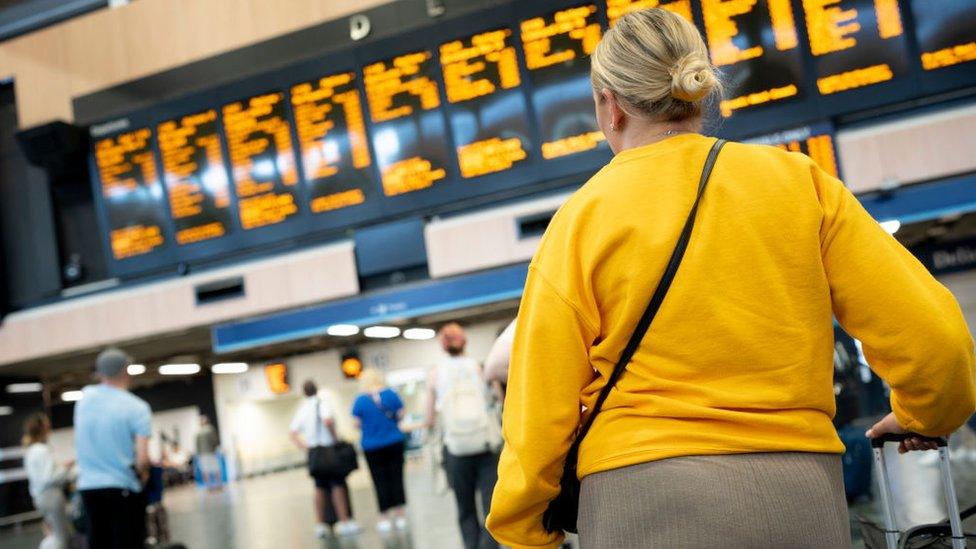Train drivers announce new January strike date
- Published
- comments

Train drivers across 15 rail companies will stage a fresh strike on 5 January in a long-running row over pay, the Aslef union has said.
It will add to major rail disruption in the first week of January, with the RMT union already planning strikes on 3-4 and 6-7 January.
Aslef said drivers did not want to go on strike but had been "pushed" to do so by the train companies.
The Rail Delivery Group said it wanted to work with Aslef to end the dispute.
"No one wants to see this strike go ahead, and we can only apologise to passengers and to the many businesses who will be hit by this damaging disruption," said a spokesperson for the RDG, which represents the train operating companies.
But Aslef boss Mick Whelan said: "The train companies say their hands have been tied by the government. While the government - which does not employ us - says it's up to the companies to negotiate with us."
The union expects 12,500 drivers to take part in its latest strike and said the action would bring services on affected lines "to a halt".
A Department for Transport spokesperson said Aslef's decision was "incredibly disappointing".
"We urge Aslef to rethink, call off strikes and speak to employers to agree a new way forward," they said.
The rail companies affected by the Aslef strike are:
Avanti West Coast
Chiltern Railways
CrossCountry
East Midlands Railway
Great Western Railway
Greater Anglia
Great Northern/Thameslink
London North Eastern Railway
Northern Trains
Southeastern
Southern/Gatwick Express
South Western Railway
SWR Island Line
TransPennine Express
West Midlands Trains
Aslef has already held five one-day strikes this year in its pay dispute. It wants any pay offer to reflect the rising cost of living
"The companies need to come to the table with a proper proposal to help our members, their drivers, buy this year what they could buy last year," the union said.
The larger RMT union is in a long-running dispute over pay, job security and conditions with both the train operating companies and Network Rail - which maintains the rails, signals and stations.
Meanwhile the rail industry is under pressure to save money, after the pandemic left a hole in its finances. Bosses say reforms need to be agreed to afford pay increases and modernise the railway.


Watch Make Sense of Strikes on iPlayer and find out more about why people are striking and whether industrial action works.

On Monday, Network Rail warned passengers to avoid travel on Christmas Eve when further strike action by RMT members is due to start. The walkout is scheduled to begin at 18:00 on 24 December and continue until 06:00 on 27 December.
RMT members are also taking part in an overtime ban at 14 train companies which began on Sunday and will last until 2 January.
The rail strikes come at a time of widespread industry walkouts across the country. More than 10,000 nurses walked out on Tuesday and ambulance drivers will take action on Wednesday.
Further strikes by Royal Mail workers belonging to the CWU are due to take place on 23 and 24 December - some of the busiest days for pre-Christmas deliveries.

How will you be affected? Share your experiences by emailing haveyoursay@bbc.co.uk, external.
Please include a contact number if you are willing to speak to a BBC journalist. You can also get in touch in the following ways:
WhatsApp: +44 7756 165803
Tweet: @BBC_HaveYourSay, external
Please read our terms & conditions and privacy policy
If you are reading this page and can't see the form you will need to visit the mobile version of the BBC website to submit your question or comment or you can email us at HaveYourSay@bbc.co.uk, external. Please include your name, age and location with any submission.
Related topics
- Published9 May 2024
